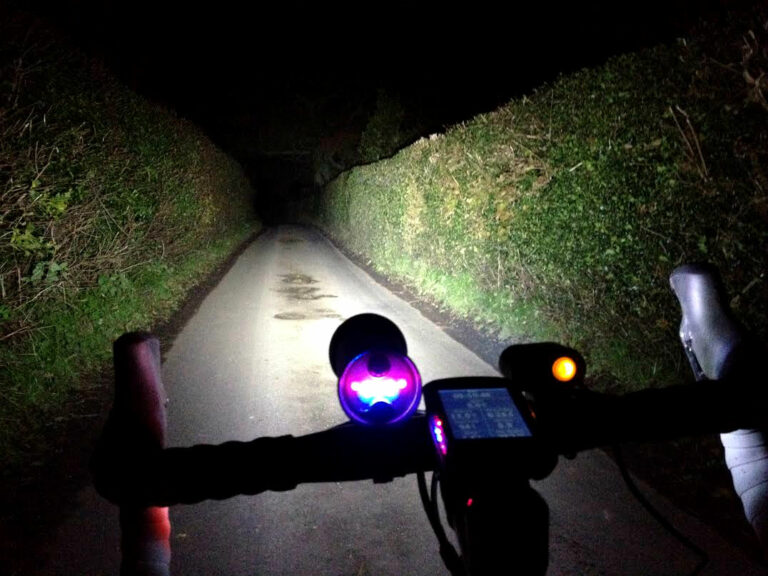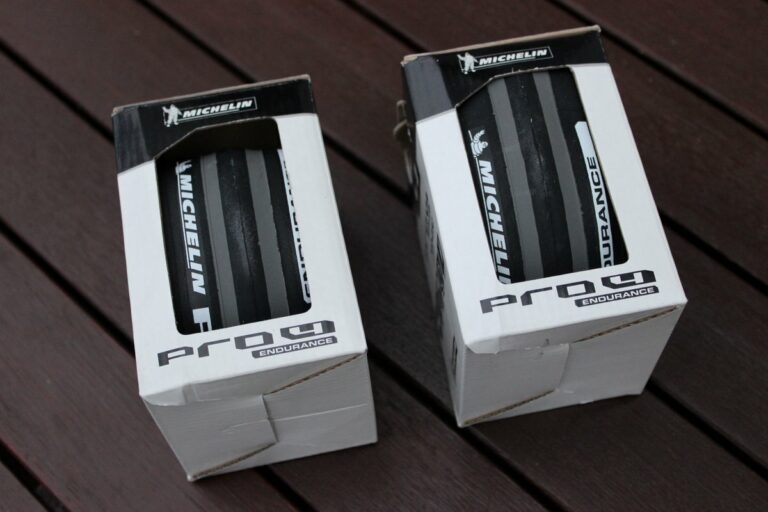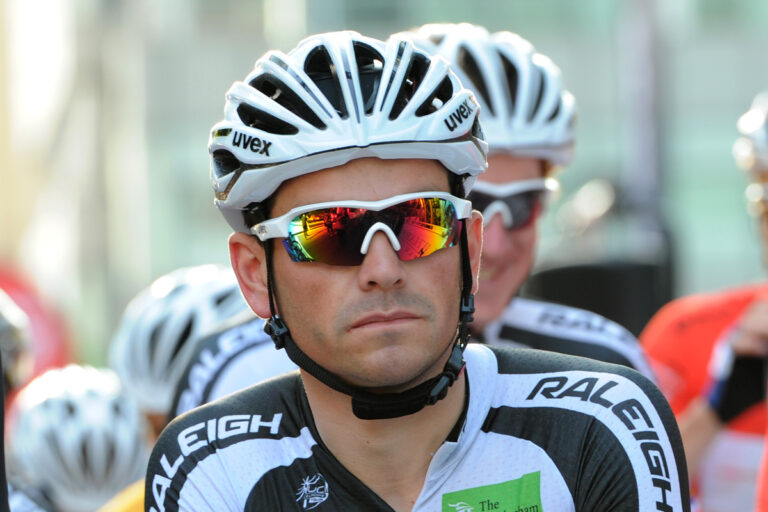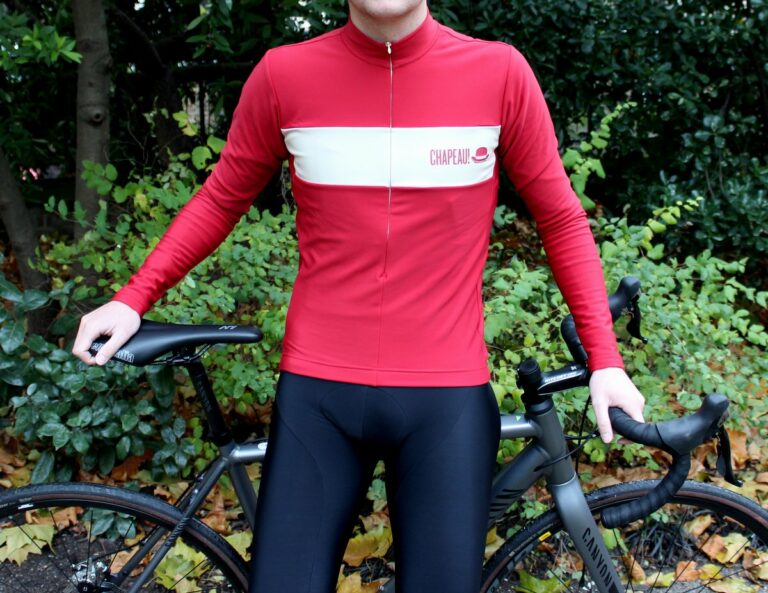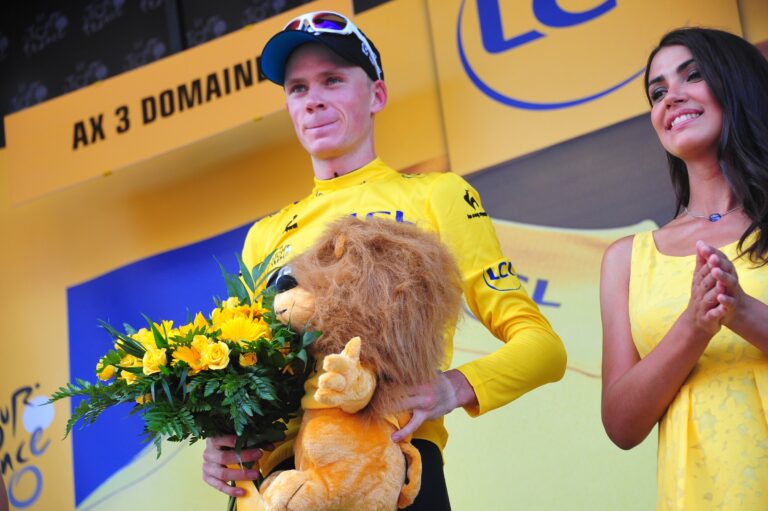I’m sitting at the back of the Team Sky bus. Its driver, Chris Slark, presses a
button on the wall and a glass door slides across, separating us from the front of
the bus. He presses another and the glass turns from clear to frosted.
“This is where Dave Brailsford likes to relax during a stage race,” says Slark, who has driven the bus from the Team Sky service course in Belgium to a test track in Warwickshire where Jaguar are hosting a Ride Like a Pro day for members of the public.
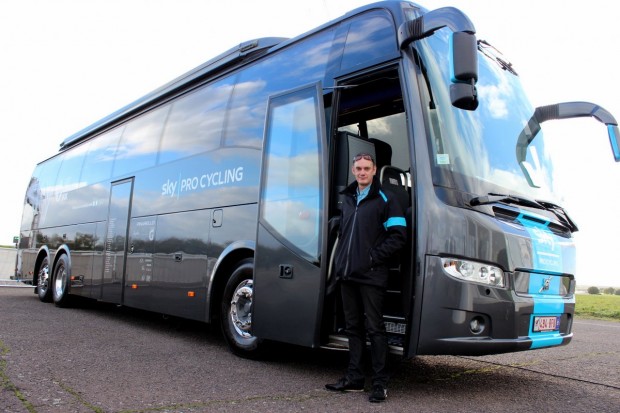
“Sometimes it’s just me and him on the bus, I’m driving to the day’s finish and he comes back here, watches the race unfold on the television, and he can relax when there’s otherwise so much going on.”
Slark joined Team Sky at the squad’s inception in 2010 and, along with Claudio Lucchini, is one of two drivers of the British WorldTour outfit’s black ‘Deathstar’ buses which draw huge crowds – the biggest of any team – at every race.
It’s a job which has seen Slark spend 200 days away from home this year – and he racked up 10,000km on the road at the Vuelta a Espana alone.
Everybody thought I was crazy because nobody ever leaves F1, but I went self-employed and got involved in all different types of motorsports. Then I got the call from Team Sky. My initial reaction was ‘no, that’s not for me’.
However, bus driver is only the most basic of job descriptions for a man for describes his role as “driver, friend, mother, psychologist and comedian all rolled into one”. The team bus is a sanctuary for riders during the heat of the season and Slark is the constant. His passion for the job – and the team – is striking but four years ago he was a cycling novice.
However, life on the road is a familiar existence for Slark, who worked in Formula One
before joining Team Sky, driving support trucks from race to race but also working as a vital cog in Honda’s pit crew for the likes of Jacques Villeneuve and Jenson Button.
“I’ve done almost every job in the pits,” he says. “But my main job was to be the second man on the fuel hose because you need someone relatively tall to support the first guy.
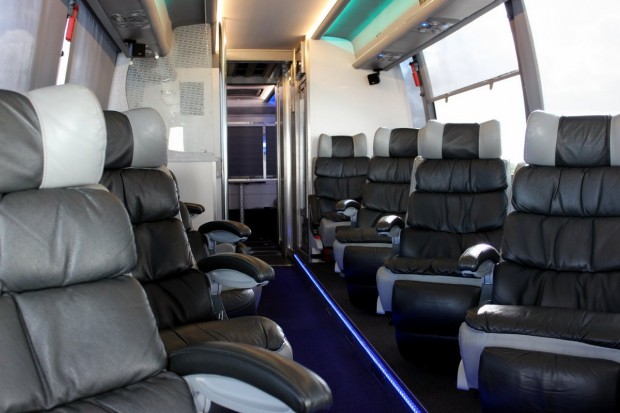
“I’ve also done wheel on, wheel off, front jack, rear jack, radiator cleaning, fuel splash guard, fire extinguisher – everything except using the wheel gun, because that’s a specialist mechanic’s job.”
Slark spent six years with Honda, first with the test team before moving to the Formula One setup, but left, tired of flying from one corner of the globe to another, and not spending enough time with his family.
“Everybody thought I was crazy because nobody ever leaves F1,” says Slark, “but I went self-employed and got involved in all different types of motorsports, then I got the call from Team Sky. My initial reaction was ‘no, that’s not for me.'”
Some things they do better in Formula One, but other things we do better in cycling. I didn’t come here to try and change everything by saying ‘well, this is how we did it in Formula One’, but I tried to see the best in F1 and the best in cycling, then put it together.
At that point, Slark, by his own admission, didn’t know anything about cycling, nor did he know who Dave Brailsford was, but friends who knew more than he did convinced him it was worth a shot.
“I went up and met with Dave and the rest is history,” he says. “I was super-impressed by his attitude and the whole concept of the team, and then they invited me to the team launch.
“I went back and discussed it with my wife and said I think I should give it a go for a year, and stick out that year no matter how hard it is, or how much I might dislike it, and then I’ll make my mind up. I’ve never looked back – it’s been phenomenal.”
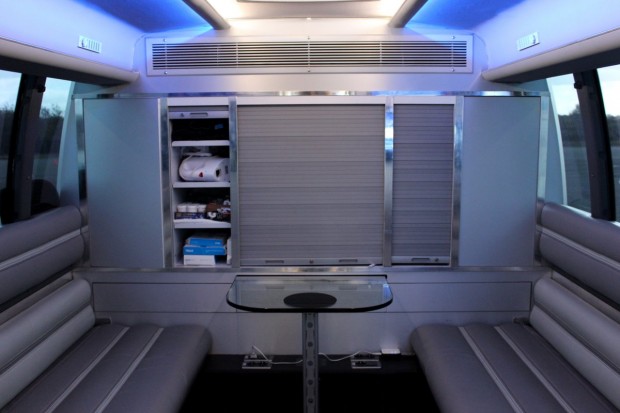
Brailsford was impressed by Slark’s background in Formula One, a sport renowned for its precision, and the mastermind behind British Cycling’s success on the track wanted to convert that success to the road with a British team.
“When Dave took me on, that was partly what we wanted, to raise the bar of the vehicles – the cleanliness, the military precision, the image, all that,” says Slark.
“Some things they do better in Formula One, but they’ve got more money, but other things we do better in cycling. I didn’t come here to try and change everything by saying ‘well, this is how we did it in Formula One’, but I tried to see the best in F1 and the best in cycling, then put it together.”
The bus is not super-practical because it’s been designed 100 per cent around riders. We’re big on marginal gains and the whole idea around the bus is to get the guys recovering as soon as possible
The arrival of ‘the Deathstar’ in January 2010, at the start of Team Sky’s debut season, caused quite a stir, among riders, team officials and fans alike, and, during a difficult opening year of for the team, some pointed to the bus as a visible example of a presumed arrogance.
It is, however, only a continuation of the marginal gains philosophy which has brought so much success to British Cycling and, four seasons and two Tour de France victories later, to Team Sky. Slark says other teams have followed in raising the quality of their vehicles.
“I think, comfort-wise and space-wise, we’ve still got the best vehicles in the peloton,” says Slark, and having been given of a tour of its interior, with reclining leather seats, mood lighting, a Bose sound system, showers, toilet (complete with high-tech Dyson hand dryer) and all the mod cons required to make a rider feel at home, it’s hard to disagree. (See RoadCyclingUK’s full photo gallery from inside the Team Sky bus here).
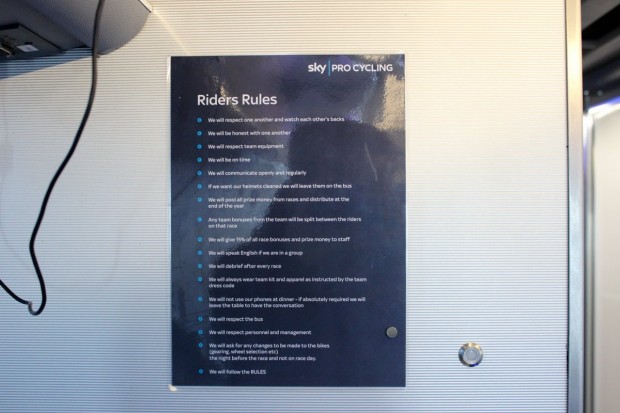
“The bus is not super-practical, other teams can get bikes and luggage underneath, but we can’t do that on here because it’s been designed 100 per cent around riders.
“We’re big on marginal gains and the whole idea around the bus is to get the guys recovering as soon as possible. When you look at some of the other buses, the
riders are not recovering until they get back to the hotel. When our guys get on the bus they’re eating, they’re taking their recovery shakes, they’re relaxed, they’re comfortable and they’re recovering immediately.
“I know the guys like it. They feel special and that’s what it’s all about – getting them in the right frame of mind, in the zone, and then getting them relaxed and recovered again. It is important – really important.
The riders spend a lot of time in here. Dave said to me when I joined: ‘We want a character and you obviously are. We like to have a laugh and joke and you need to get on well with the boys.’
“Most of the buses are comfortable now but they don’t have the same level of comfort because they’ve tried to make their buses more practical. The standards have gone up – that’s what Dave wanted – and people realise they can’t run around in a 15-year-old ramshackle bus anymore.”
That comfort extends to Slark’s role with the riders. He has grown close to many, not least to Bradley Wiggins, and his role is vital in making them feel at home on the bus.
“They spend a lot of time in here and that was another thing Dave said to me when I joined: ‘We want a character and you obviously are. We like to have a laugh and joke and you need to get on well with the boys’.
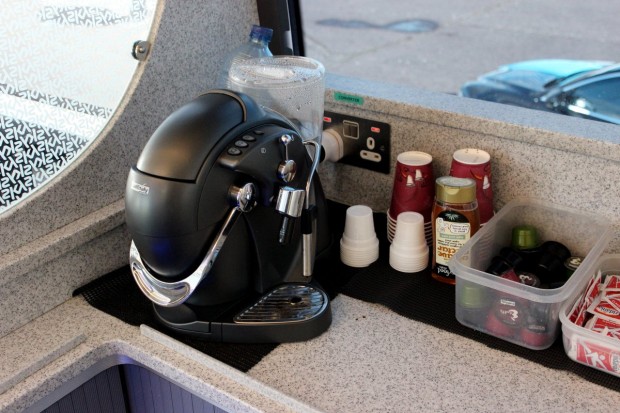
“Because I get quite friendly with the riders we have quite a few personal chats and I have to be there with them. There are certain guys who perform better when they’re happy and Wiggo is the greatest example of that. He’s at his best when he’s happy, joking and messing about. That’s probably the same for all of us – we’re at our best when we’re happy.”
Team Sky’s ‘rider rules’ are displayed clearly inside the bus (scroll to the bottom to see them in full) and give a fascinating insight into the workings of the team. There are politics, Slark says, but most issues are light-hearted and easily overcome.
While Colombian Rigoberto Uran likes the air conditioning at a balmy 28 degrees, one of the team’s Brits, Ian Stannard, prefers it at a more ‘homely’ 18 degrees. Christian Knees and Chris Sutton have the biggest influence over the sound system, used for motivation before races – “they really like to crank it up” – and to relax on the way back to the hotel of an evening.
Most of the buses are comfortable now. The standards have gone up – that’s what Dave wanted – and people realise they can’t run around in a 15-year-old ramshackle bus anymore.
“They’re all really grounded guys, there are no prima donnas,” Slark says. “You get the odd tears and the occasional tantrum but they’re passionate guys.
“We get the occasional screaming fit when someone’s had a bad day – they’ve lost, they’re cold, they’re bruised – but ten minutes later they’re apologising and we’re all good again. If they didn’t have that passion then they wouldn’t win. I totally get that.”
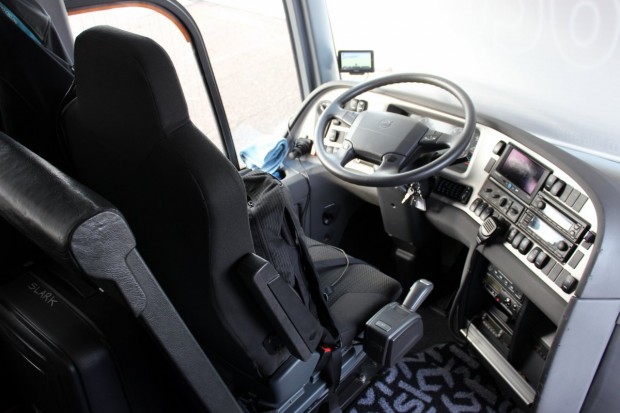
Slark’s season started at Challenge Majorca in January, and from there he went on to the Algarve, the Classics, and races including the Tours of Norway, Poland and Austria, before the Vuelta a Espana in August.
“I did a lot of the smaller races this year, which was fantastic,” he says, “but I never ask to do any particular race and I’ll always do what they ask me to do at the end of the day.
“I can only ever remember one particular race which I didn’t enjoy and that was Three Days of De Panne, which I detested because it was cold, miserable and wet, and there weren’t that many people around, so I didn’t really enjoy it, but I’ve loved everything else.”
Getting to the finish sometimes isn’t as easy as it looks. We have to go the long way around and the riders are pretty quick. It’s like a full-on bus drivers’ race down the motorway to get a good spot at the finish.
An average race day sees Slark start work at six or seven in the morning, preparing the bus for the day, driving the riders to the start, going on to the finish, and then to the team’s hotel for the evening, and he sometimes won’t wrap up until ten or eleven at night.
“Getting to the finish sometimes isn’t as easy as it looks. We have to go the long way around and the riders are pretty quick. It’s like a full-on bus drivers’ race down the motorway to get a good spot at the finish.
Running repairs fall under his remit – “fridges, washing machines and showers aren’t designed to be bounced down the motorway” – and the bus has to be cleaned (to ensure riders don’t pick up any bugs) and re-stocked on a daily basis. And there’s the driving in between.
“Getting to the finish sometimes isn’t as easy as it looks,” he says. “We have to go the long way around and the riders are pretty quick. It’s a big old race to the finish. It makes me laugh. It’s like a full-on bus drivers’ race down the motorway to get a good spot at the finish.”
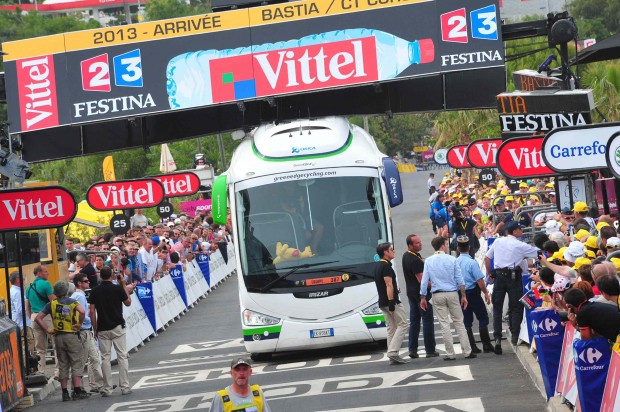
Slark rarely lets the tank get less than half empty but if he were to fill it with fuel in its entirety it would cost £800. “It only does seven miles to the gallon, so it’s very expensive,” he says.
“We get through a phenomenal amount of fuel and we’ve got the generator as well which gets through six litres an hour, too. It’s a big, big cost for the team.”
It’s impossible to talk to the Team Sky bus driver without raising stage one of the Tour de France, when Orica-GreenEDGE’s bus driver wedged his vehicle under the finish line gantry, throwing the stage into chaos.
Wiggins is the funniest bloke I’ve ever met in my life and sometime I wish he would sit down the back. People don’t get it but he is absolutely salt of the Earth
“I genuinely felt really sorry for him,” says Slark, whose counterpart Claudio was Team Sky’s bus driver on the Tour this year. “Of course, I initially laughed, but once you find out the truth – and when you’re driving with the other guys in the peloton you do get the truth – you find out it wasn’t his fault.
“He was told to come forward and his only problem was he was late. The gantry had been lowered and the guys waved him through. I would have done exactly the same thing. It could have been me but I did feel sorry for him – once I’d stopped laughing.”
Laughter is an emotion which crops up throughout our interview, whether its in jest at a rival bus driver, or the banter which keeps morale high on Team Sky’s bus, and Slark says Wiggins is the biggest comedian on the team – and the rider who attracts the most attention from fans.
“That’s the question I always get asked – where does Wiggo sit?,” he says. “And it’s always right down the front, in my ear, taking the mick out of me. Sometimes I struggle to drive because he’s so, so funny.
“He’s the funniest bloke I’ve ever met in my life and sometime I wish he would sit down the back. People don’t get it but he is absolutely salt of the Earth. I know he doesn’t always come across that way to the public but he is a genuinely nice guy, a proper family man and one of the best guys I’ve ever met in my life. He’s a great guy.”
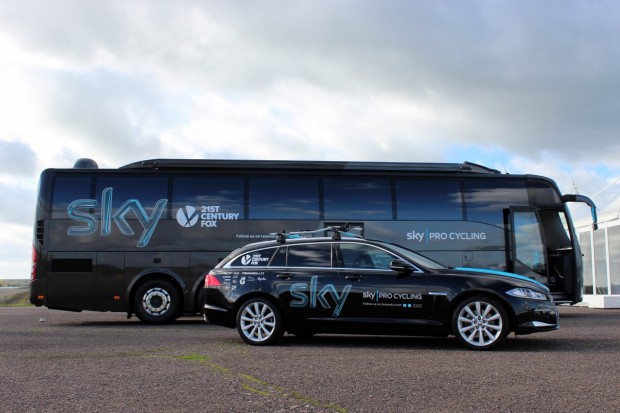
Slark’s affection for Wiggins is obvious, and their friendship became a running joke on the team, but he says it is important to maintain a professional relationship with all riders.
“There was a bit of a laugh a couple of years ago where somebody accused me at the Tour of giving Brad special treatment so I laid it on really thick,” he says. “I got a silver tray and had the towel over my arm, and was doing his washing for him, and we made a real point of taking the mick and making a big joke of it.
“And I do get friendly with the guys and miss them when they’re gone – like Juan Antonio Flecha who left the team last year – but you can’t get too attached.
“As much as I like them, you don’t want to get so close that we’re proper pals and we’re going to go out drinking together, because we’ve got to have a professional relationship.”
Those relationships are on-hold during the off-season but while the race calendar may have come to an end, and it’s time for Slark to return home to his family, preparation for next year will soon start. As Team Sky’s only full-time driver it’s his responsibility to look after all the big vehicles – both buses, two mechanics trucks and the team camper van – during the winter ahead of a new campaign.
And, Slark says, the 2014 season can’t come soon enough.
“We’ve got a phenomenal group of lads here. I love to be around them and, don’t tell them this, but I miss it when I’m away.
“I miss the banter. For me, it’s about keeping their heads in the right place, not letting them get down, and for being there for them when they need me.”
Team Sky riders rules
Team Sky’s riders rules are displayed clearly inside the bus and give a fascinating insight into the workings of the team.
– We will respect one another and watch each other’s backs
– We will be honest with one another
– We will respect team equipment
– We will be on time
– We will communicate openly and regularly
– If we want our helmets clean we will leave them on the bus
– We will pool all prize money from races and distribute evenly at the end of the year
– Any team bonuses from the team will be split evenly between the riders on that race
– We will give 15% of all race bonuses and prize money to staff
– We will speak English if we are in a group
– We will debrief after every race
– We will always wear team kit and apparel as instructed by the team dress code
– We will not use our phones at dinner – if absolutely required we will leave the table to have the conversation
– We will respect the bus
– We will respect personnel and management
– We will asked for any changes to be made to the bikes (gearing, wheel selection etc) the night before the race and not on race day
– We will follow the RULES
Chris Slark was speaking at the Jaguar Ride Like a Pro Grand Final at a private test track in Warwickshire.
See RoadCyclingUK’s full photo gallery from inside the Team Sky bus here.

